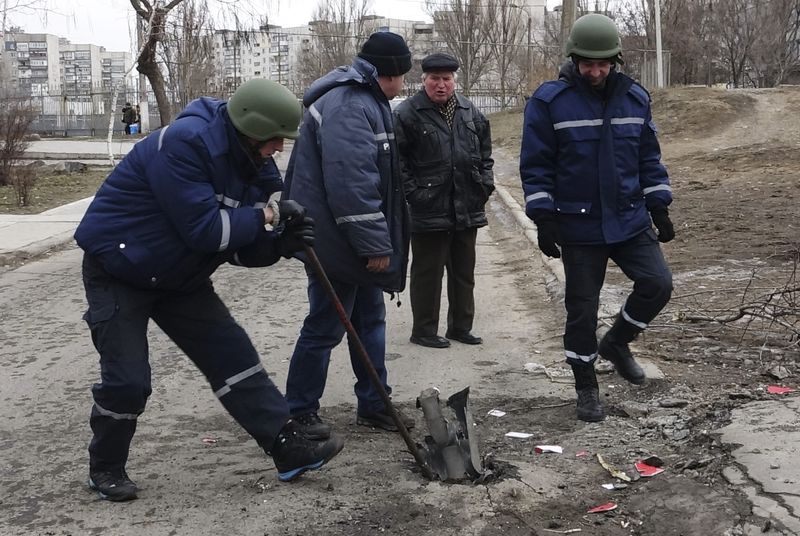By Natalia Zinets and Denis Dyomkin
KIEV/ST PETERSBURG (Reuters) - Russian-backed rebels pushed forward on Monday with a new offensive that has brought all-out war back to eastern Ukraine after a five-month ceasefire, bringing U.S. and European threats of tighter Western financial sanctions against Moscow.
Washington and Brussels are both considering new measures after accusing Russia of openly supporting the latest rebel advance in Ukraine with money, arms and troops on the ground.
Ambassadors of NATO countries and Ukraine were due to meet in Brussels to discuss a response to the fighting, their first such emergency meeting since August.
Moscow denies playing a military role, and Russian President Vladimir Putin accused Kiev of prolonging the conflict by refusing to talk to the rebels. He also said a "foreign NATO legion" was fighting alongside Ukrainian forces.
The government in Kiev said it had ordered a state of emergency across the two rebel-dominated provinces and placed all Ukrainian territory on high alert.
Its military said seven Ukrainian soldiers had been killed and 24 wounded in intensified clashes in the past 24 hours, with heavy fighting at Debaltseve, a small town the rebels have vowed to seize to safeguard their main strongholds.
Violence in eastern Ukraine is at by far its worst since a ceasefire was agreed last September. Casualties have mounted, including in the major port of Mariupol where Kiev says 30 civilians were killed in rebel shelling on Saturday.
After months during which the truce was punctured by small-scale skirmishes on the front line, rebels fighting for territory the Kremlin calls "New Russia" said last week they were left with no choice but to launch an advance. Their main aim, they say, is to push back government forces that had been shelling rebel-held cities.
The Kiev government sees the rebel advance as a repudiation of the ceasefire, restarting a war in which 5,000 people have been killed. Kiev and NATO believe thousands of Russian troops are in eastern Ukraine fighting on the rebels' behalf with advanced weapons, despite Moscow's denials.
"Rebels are constantly attacking Ukrainian government positions across the conflict zone with artillery, mortars, grenade launchers, tanks," Kiev military spokesman Volodymyr Polyovy said at a televised briefing.
The rebels have vowed to encircle Debaltseve, a town with a population of around 26,000 that straddles the main road and train line between the two principal rebel strongholds, Donetsk and Luhansk.
Government troops are holding their positions in the town in the face of intensified attack, Kiev spokesman Polyovy said.
The military has reported civilian casualties at Debaltseve without giving any figures. Shelling has cut off the town's electricity and gas supplies and knocked out phone lines.
"MORE TOOLS"
After months during which European politicians were discussing whether to start easing sanctions on Russia, the return of fighting to eastern Ukraine has suddenly shifted the debate to how to tighten them. Sanctions and the falling oil price have caused serious economic damage to Russia, with the rouble currency tumbling over the course of the past two months.
The European Union has summoned foreign ministers of its 28 member states to an emergency meeting on Thursday.
U.S. President Barack Obama said Washington was considering all options short of military action to isolate Russia, and would act jointly with European partners.
"We are deeply concerned about the latest break in the ceasefire and the aggression that these separatists -- with Russian backing, Russian equipment, Russian financing, Russian training and Russian troops -- are conducting," Obama told a news conference during a visit to India on Sunday.
U.S. Treasury Secretary Jack Lew, who oversees sanctions, was in Brussels, where he told a news conference on Monday that Washington has "more tools" to put pressure on Moscow.
In some of the strongest language yet from Brussels, Donald Tusk, the former Polish prime minister who now chairs EU summits as European Council president, denounced "appeasement" of Moscow, a word with unmistakable World War Two connotations.
"Once again, appeasement encourages the aggressor to greater acts of violence. Time to step up our policy based on cold facts, not illusions," Tusk said on Twitter over the weekend.
Germany's Foreign Minister Frank-Walter Steinmeier said that, although no one was blindly set on imposing new sanctions on Moscow, the separatist offensive was a significant change in the situation and Europe needed to react.
Moscow maintains that Kiev is to blame for the latest fighting for refusing to pull its heavy weapons away from the front line and negotiate directly with the rebels.
"Unfortunately, Ukrainian authorities are refusing a peaceful solution. They don't want political efforts," Putin told a group of students on Monday in St Petersburg.
It remains to be seen how far the rebels intend to push their latest advance. Western governments that suspect the Kremlin's hand behind the rebels have long said they believe Putin's goal is to establish a stable "frozen conflict" on Ukrainian territory.
If so, the present advance may be intended mainly to push government troops further from Donetsk and Luhansk, to make those two strongholds more secure.
Mariupol, a Black Sea port of 500,000 people, by far the largest city in the rebel-dominated provinces still in government hands, could also be a tempting prize: capturing it would link rebel-held Donetsk with the sea and Crimea, a peninsula annexed by Russia last year.

But any battle for the large port would involve urban warfare on a scale unprecedented so far in the conflict. Rebels halted at Mariupol's gates during their last big offensive, before the ceasefire was signed in September.